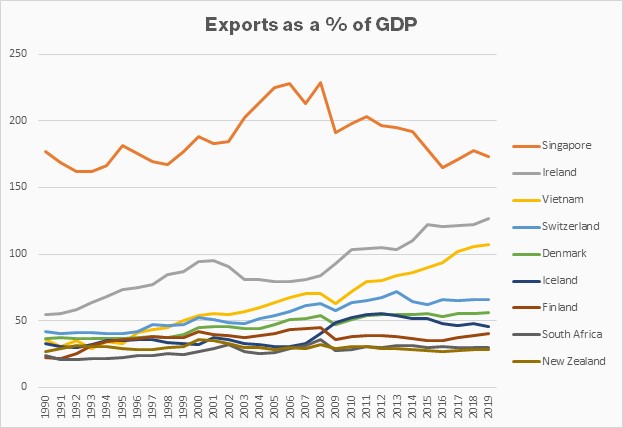The United States elections. The real winner is…

Wrong. New Zealand languishes in the small country exporting stakes coming in at the bottom of the heap.
I was alerted to the poor state of our country’s exporting ability by an article by Alison Brook on interest.co.nz. It claimed that we needed to shake off "decades of poor productivity and create sustainable growth."
I was under the impression that as a little nation at the bottom of the Pacific Ocean we were great at exporting. It was our competitive advantage.
Alison Brook pointed out that our isolation might be one factor for our poor performance in terms of growth and productivity but being small should not inhibit our performance. We only have to look at other small countries and wonder why they do so much better than us.
Brook talked about a book called Some Small Countries do it Better, by Yusuf and Nabeshima (2012). These authors looked in depth at three small countries, Singapore, Finland and Ireland who have transformed their economies to some of the richest in the world.
The authors talk about a number of key things that must happen but one in particular struck me: Building … an openness to trade.
That is us, I thought. We have that one nailed. We have always been told that we are good exporters.
Unfortunately not.
For a country that must import much of the important stuff we consume we are a very poor performer in the export stakes compared to many other small countries.
We have the lowest percentage share of exports to GDP compared to any other small advanced economy in the world, and it has got worse, not better, over the past 10 years.

Source: World Bank Development Indicators
New Zealand peaked in 2000 with our exports at 36% of GDP. We are 28% today and the trend is down.
Brooks referred to a recent report from David Skilling prepared for the New Zealand Productivity Commission. Skilling recommends encouraging 'strategic clusters' of industries where New Zealand has a competitive advantage, such as in the primary sector and the weightless digital and creative sectors.
This requires governments to pick winners. This is not popular with recent governments who prefer to take an "agnostic policy approach, treating international and local sectors in the same way."
With an election coming up maybe this glaring anomaly in our economic standing could be addressed.
I remember my father talking about the importance of trade to the living standards of New Zealanders back in the 1960s when he was a National member of parliament. I am not sure that our export competitiveness did better under National than it has under various coalition governments since those times, but someone should stand up and be counted on this today.
There is no time like the present to take bold action.
Keep asking great questions …